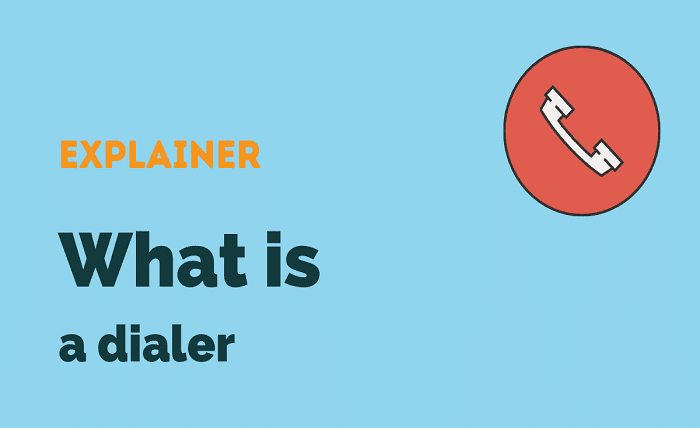
In the modern world of communication, efficiency and speed are paramount. A dialer is an innovative tool that automates the dialing process, making it indispensable for businesses and individuals alike. Whether you’re managing a call center, running a sales team, or streamlining personal communication, a dialer can significantly improve productivity and reduce manual effort. This blog explores the essentials of dialers, their functionality, and their impact on various sectors.
What is a Dialer?
A dialer is a software or hardware tool designed to simplify and automate the process of making telephone calls. Unlike traditional dialing methods, a dialer minimizes manual intervention, allowing users to connect with contacts more efficiently. There are different types of dialers, including predictive, auto, and manual dialers, each tailored to specific needs. By leveraging dialer technology, businesses can optimize their outreach processes, ensuring that calls are placed accurately and at the right time.
Types of Dialers and Their Uses
Understanding the different types of dialers is crucial for selecting the right solution for your needs:
- Predictive Dialer: This type of dialer uses algorithms to predict agent availability and call pick-up rates, dialing multiple numbers simultaneously to maximize efficiency.
- Auto Dialer: An auto dialer automatically dials numbers from a preloaded list and connects answered calls to an agent or plays a prerecorded message.
- Preview Dialer: A preview dialer allows agents to view contact details before the call is made, providing context for personalized interactions.
- Manual Dialer: While less automated, a manual dialer assists users by managing call logs and organizing contact lists for smoother operations.
Each type of dialer serves a unique purpose, making it essential to evaluate your requirements before implementation.
Benefits of Using a Dialer
The adoption of a dialer brings a plethora of benefits that enhance communication and operational efficiency:
- Increased Productivity: A dialer eliminates the need for manual dialing, saving time and allowing users to focus on meaningful conversations.
- Improved Accuracy: With a dialer, the chances of dialing incorrect numbers are significantly reduced, ensuring precise connections.
- Enhanced Call Management: A dialer provides features like call recording, analytics, and real-time reporting to streamline operations.
- Cost Efficiency: By automating repetitive tasks, a dialer reduces labor costs and optimizes resource allocation.
- Better Customer Engagement: Features like predictive dialing enable a dialer to connect with more customers in less time, improving outreach efforts.
Dialers in Different Industries
The versatility of dialer technology makes it applicable across various industries:
- Call Centers: In call centers, a dialer is essential for managing high volumes of outbound calls, ensuring agents remain productive.
- Sales and Marketing: Sales teams use dialers to reach prospects efficiently, track interactions, and close deals faster.
- Healthcare: A dialer streamlines patient communication by automating appointment reminders and follow-up calls.
- Education: Educational institutions utilize dialers to inform students and parents about important updates and events.
- Customer Support: A dialer ensures quick resolution of customer issues by directing calls to the appropriate agents without delay.
These examples highlight the transformative potential of dialer technology across diverse sectors.
How Dialers Improve Customer Experience
A dialer plays a pivotal role in enhancing customer experience by ensuring timely and personalized communication. By using a dialer, businesses can reduce wait times, connect customers with the right representatives, and maintain consistent follow-ups. Moreover, advanced features in modern dialers, such as IVR (Interactive Voice Response) and CRM integration, enable seamless interactions. These capabilities allow businesses to address customer queries efficiently, fostering trust and satisfaction.
Implementing a Dialer in Your Business
Introducing a dialer into your organization involves several key steps:
- Define Objectives: Identify what you aim to achieve with a dialer, whether it’s increasing sales, improving support, or managing large call volumes.
- Choose the Right Dialer: Select a dialer type that aligns with your business requirements, considering factors like scale, budget, and features.
- Integrate with Existing Systems: Ensure the dialer integrates seamlessly with your CRM or other communication tools for optimal functionality.
- Train Your Team: Provide comprehensive training to ensure your team can leverage the dialer effectively.
- Monitor and Optimize: Regularly track performance metrics to measure the dialer’s impact and make adjustments as needed.
By following these steps, you can successfully incorporate a dialer into your operations, reaping its full benefits.
Advanced Features to Look for in a Dialer
Modern dialers come equipped with advanced features that enhance their functionality and user experience:
- AI Integration: Some dialers leverage artificial intelligence to predict customer behavior and optimize call routing.
- Voice Analytics: This feature analyzes call quality and content to ensure compliance and improve customer interactions.
- Omnichannel Support: Advanced dialers can manage communication across multiple channels, including voice, email, and SMS.
- Cloud-Based Functionality: Cloud-based dialers offer flexibility and scalability, allowing remote access and effortless updates.
- Real-Time Reporting: Detailed analytics provided by a dialer help in tracking performance and identifying areas for improvement.
Investing in a dialer with these features ensures a future-proof communication strategy.
Conclusion
In conclusion, a dialer is more than just a communication tool—it’s a catalyst for efficiency, productivity, and improved customer engagement. By automating the dialing process, a dialer enables businesses to focus on what truly matters: building meaningful relationships and achieving operational excellence. Whether you’re part of a large organization or a small business, integrating a dialer into your workflow can transform the way you connect with customers and achieve your goals. Embrace the power of dialer technology today and unlock new opportunities for success.
FAQs
1. What is a dialer used for?
A dialer automates the process of making calls, improving efficiency and accuracy for businesses and individuals.
2. What types of dialers are available?
There are predictive, auto, preview, and manual dialers, each catering to different communication needs and use cases.
3. Can a dialer be integrated with other tools?
Yes, most modern dialers integrate seamlessly with CRM systems and other communication tools for enhanced functionality.
4. Is a dialer suitable for small businesses?
Absolutely. A dialer can streamline communication and boost productivity, making it a valuable asset for small businesses.
5. How does a dialer improve customer experience?
A dialer ensures timely, personalized communication, reduces wait times, and enhances the overall customer journey.





